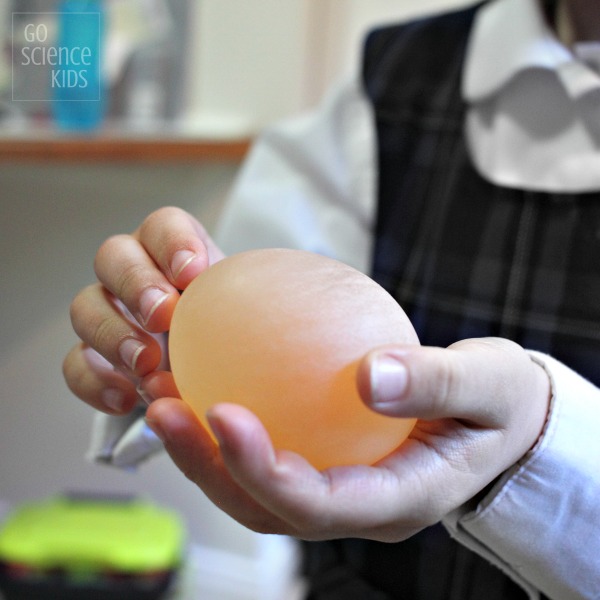
The calcium carbonate will become carbon dioxide gas which will go into the air. The acetic acid reacts with the calcium carbonate in the egg shell and releases carbon dioxide gas that you see as bubbles on the shell.

Soaking an egg in vinegar and then sucking it through a bottle is like two experiments in one.
Can you eat an egg soaked in vinegar. If you soak an egg in vinegar the eggshell will absorb the acid and break down or dissolve. The calcium carbonate will become carbon dioxide gas which will go into the air. What is left is the soft tissue that lined the inside of the eggshell.
Can you eat an egg that has been soaked in vinegar. Soaking an egg in vinegar and then sucking it through a bottle is like two experiments in one. By soaking the egg in vinegar the shell which is made up of calcium carbonate gets eaten away leaving the membrane of the egg intact.
Both experiments can be done with raw or hard-boiled eggs. Is egg soaked in vinegar edible. It seems entirely pointless.
After vinegar dissolves the eggs shell the egg absorbs some of the water in the vinegar through osmosis. After leaving the egg to soak again this time in blue water it was time to cook. What happens if you leave an egg in vinegar.
Another way to use apple cider vinegar when cooking is to make a marinade. In fact apple cider vinegar is a popular ingredient in many steak marinades as it gives the meat a nice sweet and sour flavor. Combine it with wine garlic soy sauce onion and cayenne pepper to give your steak a delicious flavor.
According to this study adding 1 or 2 tablespoons of apple cider vinegar to your diet can help you lose weight. It can also reduce your body fat percentage make you lose belly fat and decrease your blood triglycerides. This is one of a few human studies that have investigated vinegars effects on weight loss.
Soaking an egg in vinegar and then sucking it through a bottle is like two experiments in oneBy soaking the egg in vinegar the shell which is made up of calcium carbonate gets eaten away leaving the membrane of the egg intact. Both experiments can be done with raw or hard-boiled eggs. By soaking the egg in vinegar the shell which is made up of calcium carbonate gets eaten away leaving the membrane of the egg intact.
You want to end up with an egg that is soft with no shell left. The membrane of the egg will be intact leaving you with a see-through raw egg or a more rubbery hard-boiled egg. Click to read more on it.
Soaking an egg in vinegar can be a science experiment taught in some schools. You should NEVER eat any eggs or any food that was used in an experiment. If you soak an egg in vinegar the eggshell will absorb the acid and break down or dissolve.
The calcium carbonate will become carbon dioxide gas which will go into the air. What is left is the soft tissue that lined the inside of the eggshell. Things You Can Try.
Perform the experiment on a hardboiled egg. Try other variations of vinegar such as concentrated or apple cider vinegar. You can also replace vinegar with vinegar and baking soda solution coke corn syrup salt water tap water.
Vinegar has you can if you want too. Boiled eggs soaked in vinegar A lot of newly diagnosed also drink apple cider vinegar OC. After about 24 hours has passed you should replace the vinegar Egg shells contain calcium carbonateRoll the egg Testing would tell if it works for you joker33.
Can you eat an egg soaked in vinegar. Posted at 0820h in 123 by 0 Comments in 123 by 0 Comments. How to eat vinegar soaked eggs correctly.
Vinegar soaked egg is a secret recipe of keeping healthy that has been passed down for a hundred years in China. Vinegar soaked egg can improve metabolism enhance physique improve disease resistance immunity and other functions of disease prevention and control. So after soaking in vinegar you should have also noticed that the egg increases a little in size.
This is because the water in the vinegar can enter the egg through the membrane moving from the higher water concentration in vinegar to the lower concentration in the egg. To prepare egg vinegar take a freshly-laid egg if possible and 180ml rice vinegar. Wash the egg and soak in vinegar in a jar with a lid on for two days.
After 48 hours you will see that the eggshell has dissolved. This was fun just submerge an egg in vinegar for two days. What happens if you leave an egg in vinegar.
If you soak this egg shell in vinegar which is about 4 acetic acid you start a chemical reaction that dissolves the calcium carbonate shell. The acetic acid reacts with the calcium carbonate in the egg shell and releases carbon dioxide gas that you see as bubbles on the shell. Caleb brought home a book from school that suggested we soak an egg in vinegar for a few days and then bounce it low and gentle.